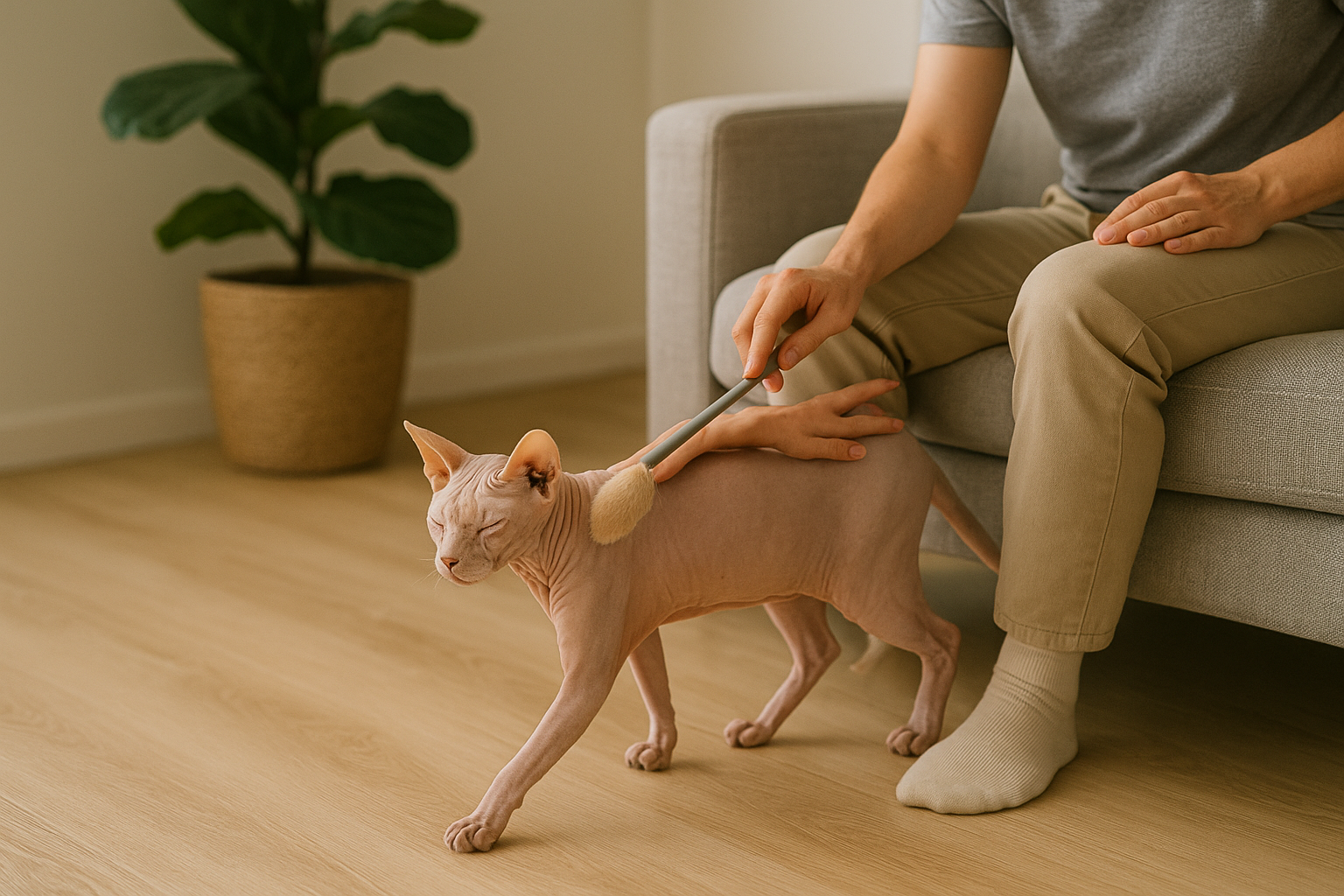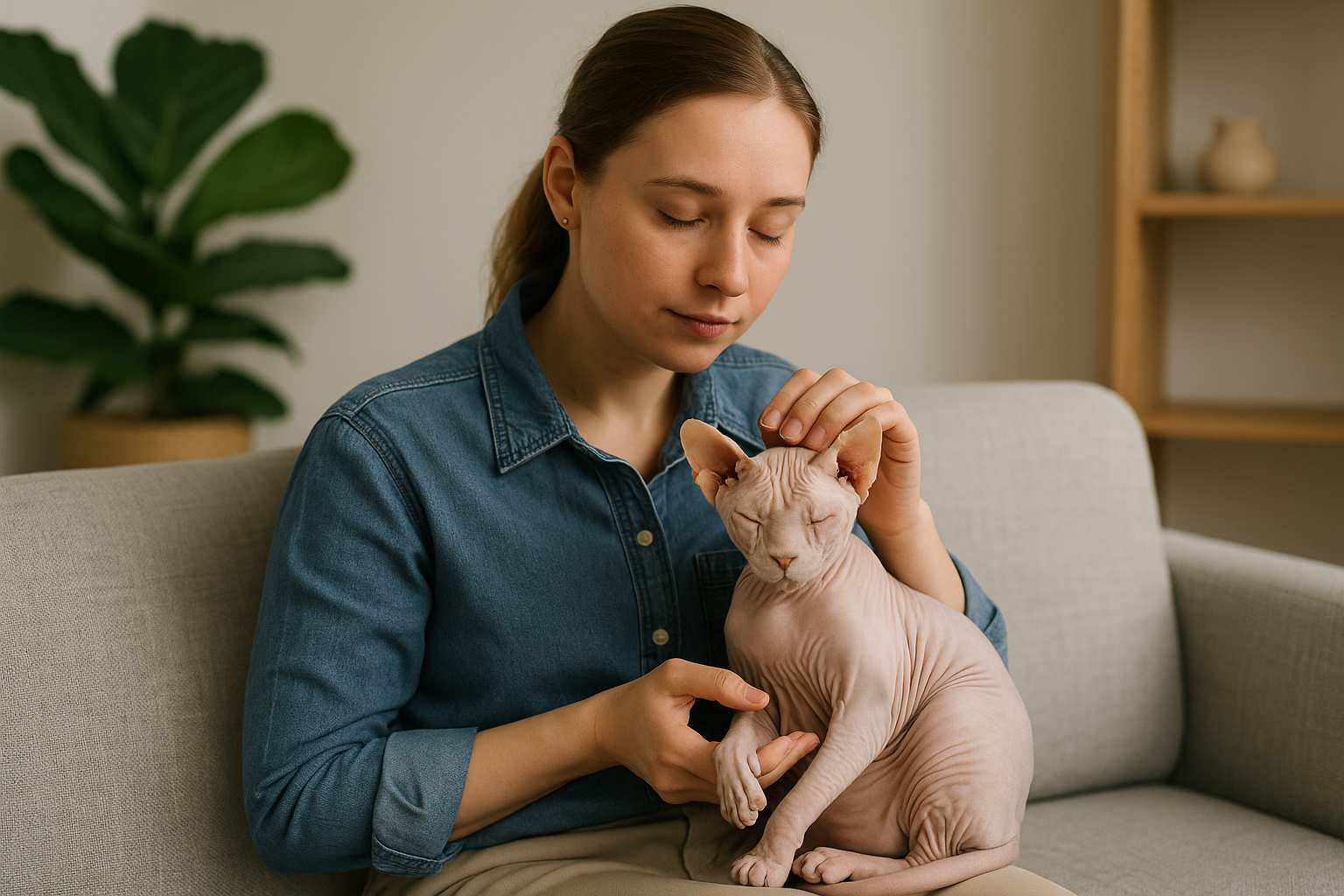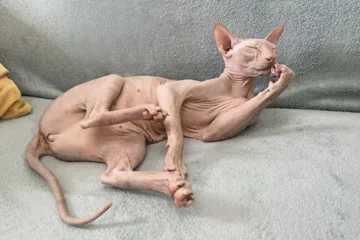Have you ever wondered what it’s like caring for a blind hairless cat? Maybe you’re thinking about adopting one, or perhaps your beloved Sphynx has started losing their sight. Either way, you’re probably feeling a bit overwhelmed right now. Don’t worry – I’ve been there too, and I’m here to walk you through everything you need to know.
Living with a blind hairless cat isn’t as scary as it sounds. Sure, these little guys need some extra love and attention, but they’re incredibly resilient and can live absolutely amazing lives. Let me share what I’ve learned about making life perfect for these special felines.
What Makes Blind Hairless Cats So Unique?
Sphynx cats are already pretty special – they’re like little naked aliens with huge personalities! When you add blindness to the mix, you get a cat that’s basically a master of adaptation. These cats are naturally outgoing and energetic, which actually helps them adjust to vision loss better than you might think.
The thing is, hairless cats face a double challenge. They can’t see where they’re going, AND they don’t have fur to protect them from bumps, temperature changes, or UV rays. But here’s the amazing part – they figure it out faster than most people expect.
Why Do Hairless Cats Go Blind?
Before we dive into care tips, let’s talk about why this happens. Understanding the “why” can help you prevent problems or catch them early:
Born this way: Some Sphynx kittens come into the world with eye problems or inherit vision issues from their parents.
Accidents happen: Without fur around their eyes for protection, hairless cats can get injured more easily. A simple scratch can sometimes lead to bigger problems.
Getting older: Just like us humans, senior cats can develop cataracts or other age-related eye issues.
Health problems: Things like diabetes or high blood pressure can mess with a cat’s vision over time.
Infections: If an eye infection doesn’t get treated properly, it can cause permanent damage.
Daily Life with Your Blind Hairless Cat

Keeping Them Warm and Clean
This is probably the biggest difference you’ll notice. Your blind hairless cat can’t see sunny spots to warm up in or avoid cold drafts. Here’s what works:
Bath time made easy: You’ll need to bathe your cat every week or two because they get oily skin (it’s totally normal for hairless cats). Use lukewarm water – not hot, not cold – and talk to them the whole time so they know you’re there. I always use the same gentle cat shampoo so they recognize the smell.
Temperature is everything: Get some heated cat beds – trust me, they’re worth every penny. In winter, little cat sweaters are a lifesaver. Just make sure the house isn’t too cold, because your blind cat might not realize they’re getting chilly until it’s too late.
Sun safety: If your cat likes to sit by windows, you might need cat-safe sunscreen. I know it sounds weird, but hairless cats can actually get sunburned!
Making Your Home Blind-Cat Friendly
The golden rule? Don’t move stuff around! Your blind cat is going to create a mental map of your house, and every time you rearrange furniture, you’re basically scrambling their GPS.
Keep the important stuff in place: Food bowls, water dishes, and the litter box should never move. Ever. Your cat will memorize exactly how many steps it takes to get from their favorite napping spot to their food.
Add some texture: Put different textured mats in front of important areas. A rough mat by the litter box, a soft one by their food – it’s like leaving breadcrumbs for them to follow.
Background noise helps: Leave the TV or radio on low volume. It gives them something to orient themselves with and makes the house feel less empty when you’re not home.
Feeding Your Special Cat
Blind hairless cats often have bigger appetites than regular cats because they burn more calories staying warm. Here’s what I’ve learned about feeding them right:
What Goes in the Bowl
High-quality protein: Look for cat food with real chicken, fish, or other meat as the first ingredient. Their skin needs extra support, so don’t cheap out on food.
Healthy fats: Omega-3 and omega-6 fatty acids are like moisturizer from the inside out. Fish-based foods are great for this.
Consistent schedule: Feed them at the same times every day, in the same spot. I make a little clicking sound with my tongue before putting the food down – now my cat comes running whenever she hears it!
Making Mealtime Easy
Put the food and water bowls on a textured placemat so your cat can find them easily. Raised bowls can be helpful too – less bending down means less chance of bumping into things.
Keeping Them Active and Happy
Just because your cat can’t see doesn’t mean they don’t want to play! Hairless cats are naturally energetic, and blind cats are no different.
Games That Work
Sound toys are amazing: Anything that crinkles, jingles, or makes noise will drive them crazy (in a good way). Crinkly balls are my cat’s absolute favorite.
Texture is fun: Get toys with different materials – furry mice, rubber balls, rope toys. Let them explore with their paws and mouth.
Hide and seek with treats: Hide small treats around areas they know well. They’ll use their nose to hunt them down, which is great mental exercise.
Puzzle feeders: These make them work for their food and keep their minds busy.
Safe Play Areas
Set up a dedicated play zone with soft blankets or rugs. Remove anything sharp or breakable. Your cat will learn this is their “safe zone” where they can go crazy without worry.
Health Stuff You Need to Know
Regular vet visits become super important when you have a blind hairless cat. Here’s what to watch for:
Regular Check-ups
Visit the vet every six months instead of yearly. Your vet needs to keep an eye on their overall health, check their skin, and monitor any remaining vision they might have.
Skin Problems
Watch for acne, rashes, or dry patches. Blind cats sometimes don’t groom themselves as well, so you might need to help them out. A warm, damp cloth works wonders for gentle cleaning.
Weight Watching
Blind cats might be less active, so keep an eye on their weight. Feel along their ribs – you should be able to feel them but not see them. If you’re not sure, ask your vet to show you.
Building Their Confidence
This is probably the most important part. A confident blind cat is a happy blind cat.
Let Them Learn
Don’t rush to help with everything. Let them bump into things occasionally – that’s how they learn where stuff is. Just make sure there’s nothing dangerous they can run into.
Use your voice: Talk to them way more than you would a sighted cat. Tell them what you’re doing, where you are, when you’re leaving. They’ll learn to recognize your “I’m coming downstairs” footsteps versus your “I’m going to the kitchen” footsteps.
Scent markers: Dab a tiny bit of vanilla extract (the real stuff, not imitation) in different areas of the house. Each room gets its own scent, helping them navigate.
Stick to Routines
Cats love routines anyway, but blind cats absolutely depend on them. Wake up, feed, play, nap – keep it consistent, and they’ll be so much more relaxed.
Common Problems and How to Fix Them

Litter Box Issues
Use the same type of litter every time – unscented clumping works best. Keep it the same depth (about 2-3 inches) and clean it regularly. If you change brands, mix the new with the old for a few days.
Consider getting a bigger litter box with lower sides. High sides can be tricky for blind cats to navigate.
Getting Around
If your cat seems confused or scared, guide them gently with your voice, not your hands. Say things like “step up” for stairs or “careful” for obstacles. They’ll learn what these words mean.
Grooming Help
Your blind cat might miss spots when cleaning themselves. A soft brush once a day helps, and they usually love the attention. Pay extra attention to areas they can’t easily reach.
Finding Support
You’re not alone in this! There are tons of people online who have blind cats, and they’re usually super helpful. Facebook groups, Reddit communities, and pet forums are great places to ask questions and share experiences.
Professional Help
Veterinary ophthalmologists: If your cat still has partial vision, these specialists can sometimes help preserve what’s left.
Cat behaviorists: If your cat is having trouble adjusting, a professional can provide customized advice.
Experienced groomers: Some groomers specialize in hairless breeds and can teach you techniques for at-home care.
What About Emergencies?
Have a plan ready. Keep your vet’s emergency number handy, along with the nearest 24-hour animal hospital. Know exactly where your cat’s carrier is, and maybe keep a spare blanket in it since hairless cats get cold quickly.
The Amazing Thing About Blind Cats
Here’s what nobody tells you: blind cats often become incredibly bonded with their humans. They develop super-hearing and can tell your footsteps apart from everyone else’s. They’ll greet you at the door, follow you around, and often become the most affectionate cats you’ve ever had.
My blind Sphynx knows when I’m having a bad day before I do. She’ll come sit on my lap and purr until I feel better. There’s something really special about the connection you develop with these cats.
Signs Your Cat is Doing Great
They’re playing: A happy blind cat will still play, explore, and get into mischief.
Good appetite: They’re eating well and maintaining a healthy weight.
Social and loving: They seek out attention and enjoy being petted.
Confident movement: They navigate familiar areas without hesitation.
Healthy skin: Their skin looks good and doesn’t seem irritated.
The Bottom Line
Caring for a blind hairless cat takes some extra thought, but it’s not overwhelming once you get the hang of it. These cats adapt amazingly well, and many people can’t even tell their cat is blind unless you mention it.
The key things to remember:
- Keep everything consistent
- Talk to them a lot
- Make sure they stay warm
- Don’t overprotect them
- Regular vet visits are crucial
- They can live completely normal, happy lives
A Personal Note
If you’re on the fence about adopting a blind hairless cat, or if you’re worried about your cat’s recent vision loss, let me tell you something: these cats don’t feel sorry for themselves. They wake up each day ready to play, cuddle, and just be cats.
Yes, they need some accommodations, but honestly, most of it becomes second nature pretty quickly. The love and companionship you’ll get back makes every bit of extra effort worth it.
Your blind hairless cat doesn’t know they’re “different” – they just know they’re loved. And that’s really all that matters.




